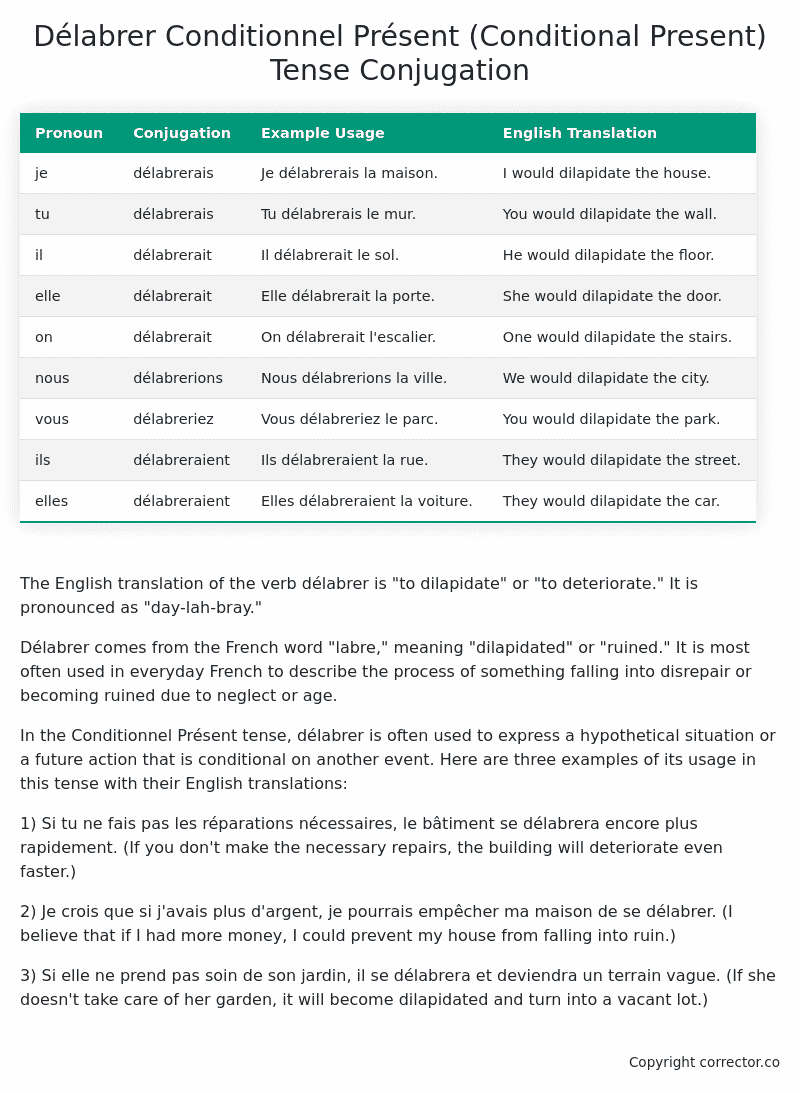Conditionnel Présent (Conditional Present) Tense Conjugation of the French Verb délabrer
Introduction to the verb délabrer
The English translation of the verb délabrer is “to dilapidate” or “to deteriorate.” It is pronounced as “day-lah-bray.”
Délabrer comes from the French word “labre,” meaning “dilapidated” or “ruined.” It is most often used in everyday French to describe the process of something falling into disrepair or becoming ruined due to neglect or age.
In the Conditionnel Présent tense, délabrer is often used to express a hypothetical situation or a future action that is conditional on another event. Here are three examples of its usage in this tense with their English translations:
1) Si tu ne fais pas les réparations nécessaires, le bâtiment se délabrera encore plus rapidement. (If you don’t make the necessary repairs, the building will deteriorate even faster.)
2) Je crois que si j’avais plus d’argent, je pourrais empêcher ma maison de se délabrer. (I believe that if I had more money, I could prevent my house from falling into ruin.)
3) Si elle ne prend pas soin de son jardin, il se délabrera et deviendra un terrain vague. (If she doesn’t take care of her garden, it will become dilapidated and turn into a vacant lot.)
Table of the Conditionnel Présent (Conditional Present) Tense Conjugation of délabrer
| Pronoun | Conjugation | Example Usage | English Translation |
|---|---|---|---|
| je | délabrerais | Je délabrerais la maison. | I would dilapidate the house. |
| tu | délabrerais | Tu délabrerais le mur. | You would dilapidate the wall. |
| il | délabrerait | Il délabrerait le sol. | He would dilapidate the floor. |
| elle | délabrerait | Elle délabrerait la porte. | She would dilapidate the door. |
| on | délabrerait | On délabrerait l’escalier. | One would dilapidate the stairs. |
| nous | délabrerions | Nous délabrerions la ville. | We would dilapidate the city. |
| vous | délabreriez | Vous délabreriez le parc. | You would dilapidate the park. |
| ils | délabreraient | Ils délabreraient la rue. | They would dilapidate the street. |
| elles | délabreraient | Elles délabreraient la voiture. | They would dilapidate the car. |
Other Conjugations for Délabrer.
Le Present (Present Tense) Conjugation of the French Verb délabrer
Imparfait (Imperfect) Tense Conjugation of the French Verb délabrer
Passé Simple (Simple Past) Tense Conjugation of the French Verb délabrer
Passé Composé (Present Perfect) Tense Conjugation of the French Verb délabrer
Futur Simple (Simple Future) Tense Conjugation of the French Verb délabrer
Futur Proche (Near Future) Tense Conjugation of the French Verb délabrer
Plus-que-parfait (Pluperfect) Tense Conjugation of the French Verb délabrer
Passé Antérieur (Past Anterior) Tense Conjugation of the French Verb délabrer
Futur Antérieur (Future Anterior) Tense Conjugation of the French Verb délabrer
Subjonctif Présent (Subjunctive Present) Tense Conjugation of the French Verb délabrer
Subjonctif Passé (Subjunctive Past) Tense Conjugation of the French Verb délabrer
Subjonctif Imparfait (Subjunctive Imperfect) Tense Conjugation of the French Verb délabrer
Subjonctif Plus-que-parfait (Subjunctive Pluperfect) Tense Conjugation of the French Verb délabrer
Conditionnel Présent (Conditional Present) Tense Conjugation of the French Verb délabrer (this article)
Conditionnel Passé (Conditional Past) Tense Conjugation of the French Verb délabrer
L’impératif Présent (Imperative Present) Tense Conjugation of the French Verb délabrer
L’infinitif Présent (Infinitive Present) Tense Conjugation of the French Verb délabrer
Struggling with French verbs or the language in general? Why not use our free French Grammar Checker – no registration required!
Get a FREE Download Study Sheet of this Conjugation 🔥
Simply right click the image below, click “save image” and get your free reference for the délabrer Conditionnel Présent tense conjugation!

Délabrer – About the French Conditionnel Présent (Conditional Present) Tense
Formation
Common Everyday Usage Patterns
Expressing Polite Requests
Expressing Hypothetical Situations
Expressing Doubt or Uncertainty
Interactions with Other Tenses
Present Tense
Past Tense
Future Tense
Conditional Perfect
Summary
Want More?
I hope you enjoyed this article on the verb délabrer. Still in a learning mood? Check out another TOTALLY random French verb conjugation!


